Dr. Mardy's Quotes of the Week ("Integrity")
April 6-12, 2025 | THIS WEEK'S THEME: “Integrity"
Opening Line of the Week
These are the opening words of the Foreword to the book, and they clearly express Devlin’s desire to tell the world about what she regarded as the great struggle of her times: removing “the bonds of economic slavery” from the people of Northern Ireland.
About the title, Devlin went on to explain: “The Price of My Soul refers not to the price for which I would be prepared to sell out, but rather to the price we all must pay in life to preserve our own integrity.”
Devlin’s Foreword is significant for two other reasons. First, she reveals that her mother had always dreamed of writing an autobiography titled The Price of My Soul, but never got around to it. And the second is that it concludes with her most widely quoted observation:
“To gain that which is worth having, it may be necessary to lose everything else.”
For more than 2,000 memorable opening lines from every genre of world literature, go to www.GreatOpeningLines.com.
This Week’s Puzzler
On April 13, 1909, this woman was born in Jackson, Mississippi. Her mother was a book-loving schoolteacher and her father an insurance executive who had a deep fascination with gadgets and photography. Growing up, she was surrounded by books, and after briefly studying at the Mississippi State College for Women, she transferred to the University of Wisconsin, where she got a B.A. degree in English Literature in 1929.
In 1930, she moved to New York City, where she attended Columbia University’s Graduate School of Business. With a degree in English Literature, she knew her employment prospects were dim, and she hoped to weather the hard economic times with a more “practical” career. After her father’s death in 1931, however, she discontinued her studies and returned home.
After working for several years as a publicist and photographer, she began to work full-time on a writing career—and it was her gifts as a storyteller that ultimately secured her a place in literary history. After her first short story collection, A Curtain of Green and Other Stories, was published in 1941, she was being described as a major new voice in Southern literature. She went on to produce a large body of work that included Delta Wedding (1946), The Golden Apples (1949), and The Ponder Heart (1954).
In 1972, she won a Pulitzer Prize for The Optimist’s Daughter, a novel the Pulitzer committee described as “A deeply moving, subtle, and beautifully crafted work.” Over the years, her influence extended far beyond the South, earning her the Presidential Medal of Freedom in 1980 and the National Book Foundation’s Medal for Distinguished Contribution to American Letters in 1991.
Though she traveled widely, she lived her entire adult life in the family home where she was raised, writing in an upstairs bedroom that would later become a literary pilgrimage site. After her death in 2001, the family home was named a National Historic Landmark and turned into a museum.
In a 1978 essay on the craft of writing, she wrote:
Who is this person? (Answer below)
What Does Integrity Mean To You?
The Random House Dictionary defines integrity as:
“Adherence to moral and ethical principles; soundness of moral character.”
Integrity derives from the Latin root integritas, meaning “intact; whole; complete.” For more than five centuries, integrity has been the preferred word to describe moral uprightness. The root sense of the word is clear: integrity is demonstrated when a person’s beliefs, words, and actions have a sense of unity or wholeness.
By contrast, when people lack integrity, there is a disconnect. They say things that are inconsistent with the truth or, worse, say things they don’t themselves believe. And when it comes to their behavior, people who lack integrity often act in ways that run counter to their beliefs. President Dwight D. Eisenhower believed integrity was an essential leadership trait, once saying:
In a “Usage Note,” the editors of the American Heritage Dictionary contrasted integrity with honesty and honor. While acknowledging that all three “denote the quality of being upright in principle and action,” they wrote that integrity had one particular quality that sets it apart:
“Integrity is moral soundness, especially as it is revealed in dealings that test steadfastness of purpose.”
Integrity is about remaining true to one’s core principles when life puts them to the test. Integrity helps people “weather the storm,” so to speak, when their principles are in danger of collapsing under the strain of such “stressors” as fame, success, failure, suffering, temptation, and, perhaps most of all, the acquisition of power. In coming to this view many years ago, I was greatly assisted by a famous passage in world literature:
The person speaking here, of course, is Howard Roark, a New York architect who served as the The Fountainhead’s protagonist. He fully embodies Rand’s philosophical outlook, especially her core values of individualism, independence, and integrity. In the novel, he refuses to compromise his principles or modify his artistic vision to reflect societal conventions. Many years ago, as I was trying to clarify my own thinking on the subject of personal integrity, I found Roark’s belief that a house can have integrity extremely helpful. Let me explain.
In architecture, engineering, and the building trades, a structure is said to have integrity when it is designed and constructed to withstand all kinds of stresses and challenges. A bridge with structural integrity will endure heavy loads, of course, but also the additional strain of tornados, hurricanes, and earthquakes. A bridge lacking in structural integrity will fail.
Something similar applies to human beings. Like a building with structural integrity, individuals must have moral integrity to withstand ethical stressors—particularly those tied to power, wealth, and fame. Unlike the world of construction, though, where we rely on building inspectors to help ensure public safety, we don’t have integrity inspectors in the interpersonal world to protect us from unethical or immoral people.
This is especially true in the political arena. If you were to pose the question “Do you regard yourself as a person of integrity?” to all U.S. Senators and Members of Congress, I’m pretty sure all 535 of them would say yes. But, clearly, a number of them would be lying—to you as well as to themselves.
In early 2025, for example, Democratic Senator Bob Menendez of New Jersey was convicted in a political corruption trial and sentenced to 11 years in prison. And two months earlier, we saw Republican Congressman Matt Gaetz of Florida, resign his House seat just days before the House Ethics Committee was scheduled to release a report that found “substantial evidence” he regularly used illegal drugs and paid young women for sex, including one who was only 17 years old. I wish I could say that Menendez and Gaetz were statistical outliers, but I’m afraid there are many more like them running around the halls of Congress—and an equally large percentage in the other two branches of government.
So, what is the implication? In a democracy, it is we the people who must take on the role of integrity inspectors, and we get a chance to file our inspection reports every time we vote in an election. Sadly, not enough showed up in the 2024 presidential election, but if the madness and mayhem continue in Washington, DC, I expect to see them coming out in droves in the mid-term elections in less than two years.
In the meantime, keep these observations from two of my favorite people in the forefront of of your mind:
This week, take a few moments to think about what integrity means to you and how important it is in your life. Also give some thought to how effectively you’ve been able to gauge the integrity levels of people you’ve befriended and politicians you’ve supported. To stimulate your thinking, here are a number of observations on this important theme in human life:
The test of integrity is its blunt refusal to be compromised. — Chinua Achebe
Trust and integrity are precious resources, easily squandered, hard to regain. — Sissela Bok
Live so that when your children think of fairness and integrity, they think of you. — H. Jackson Browne, Jr.
Integrity has no need of rules. — Albert Camus
There is no better test of a man's ultimate chivalry and integrity than how he behaves when he is wrong. — G. K. Chesterton
In failing circumstances no man can be relied on to keep his integrity. — Ralph Waldo Emerson
Men of integrity, by their very existence, rekindle the belief that as a people we can live above the level of moral squalor. — John W. Gardner
Integrity without knowledge is weak and useless, and knowledge without integrity is dangerous and dreadful. — Dr. Samuel Johnson
Integrity is so perishable in the summer months of success. — Vanessa Redgrave
If you have integrity, nothing else matters. If you don’t have integrity, nothing else matters. — Alan Simpson
For source information on these quotations, and more observations on the theme of INTEGRITY, go here.
Cartoon of the Week
Answer to This Week’s Puzzler
Eudora Welty (1909-2001)
Dr. Mardy’s Observation of the Week
Thanks for joining me again this week. See you next week, when the theme will be “Cats & Dogs and Their Owners.”
Mardy Grothe
My Two Websites: www.drmardy.com and www.GreatOpeningLines.com
Regarding My Lifelong Love of Quotations: A Personal Note

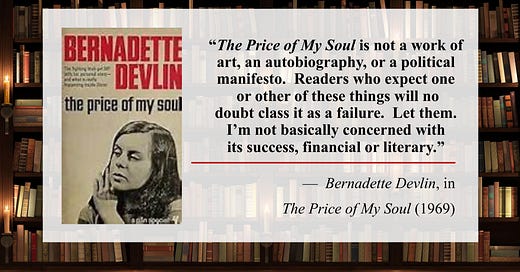



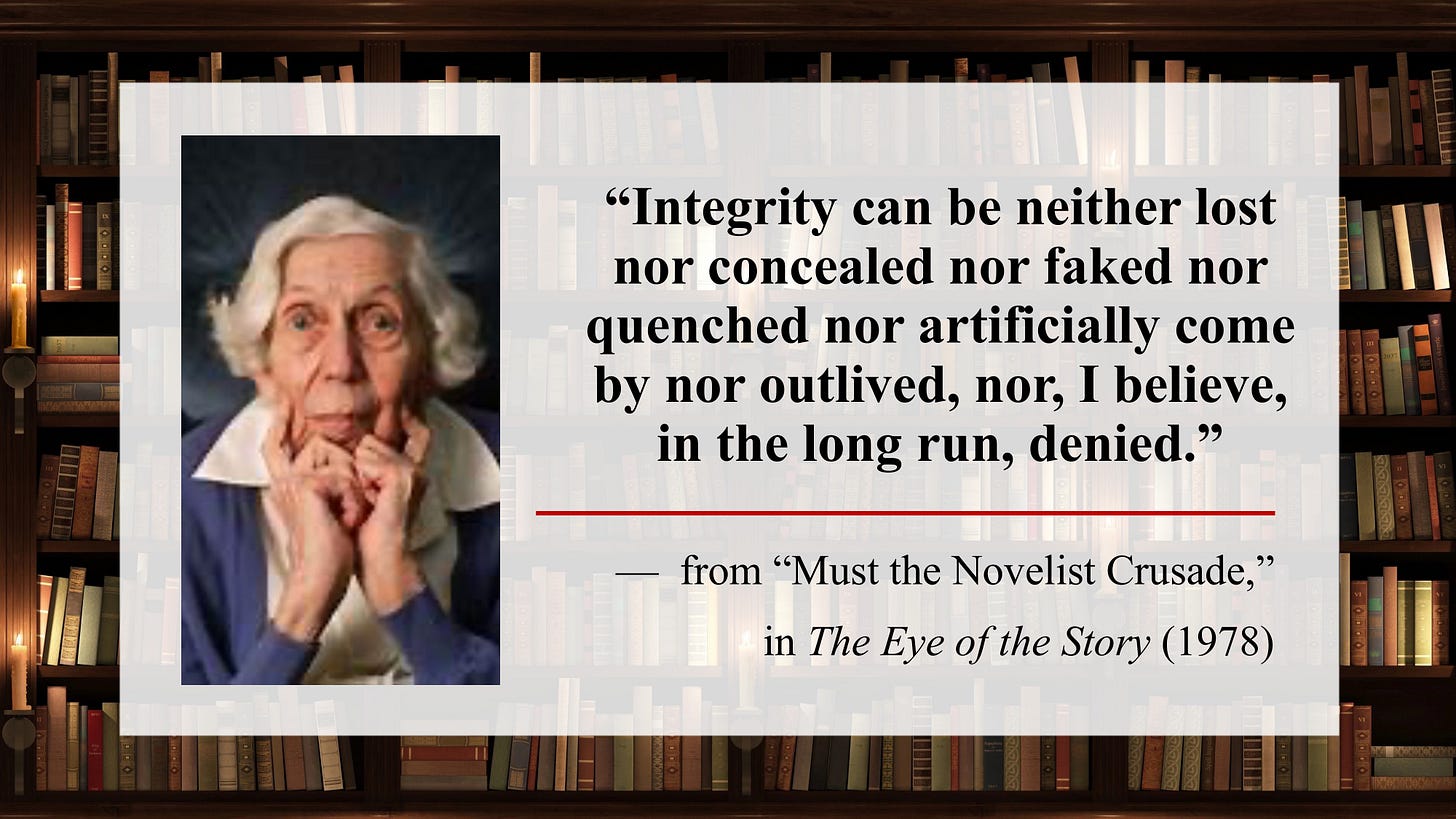

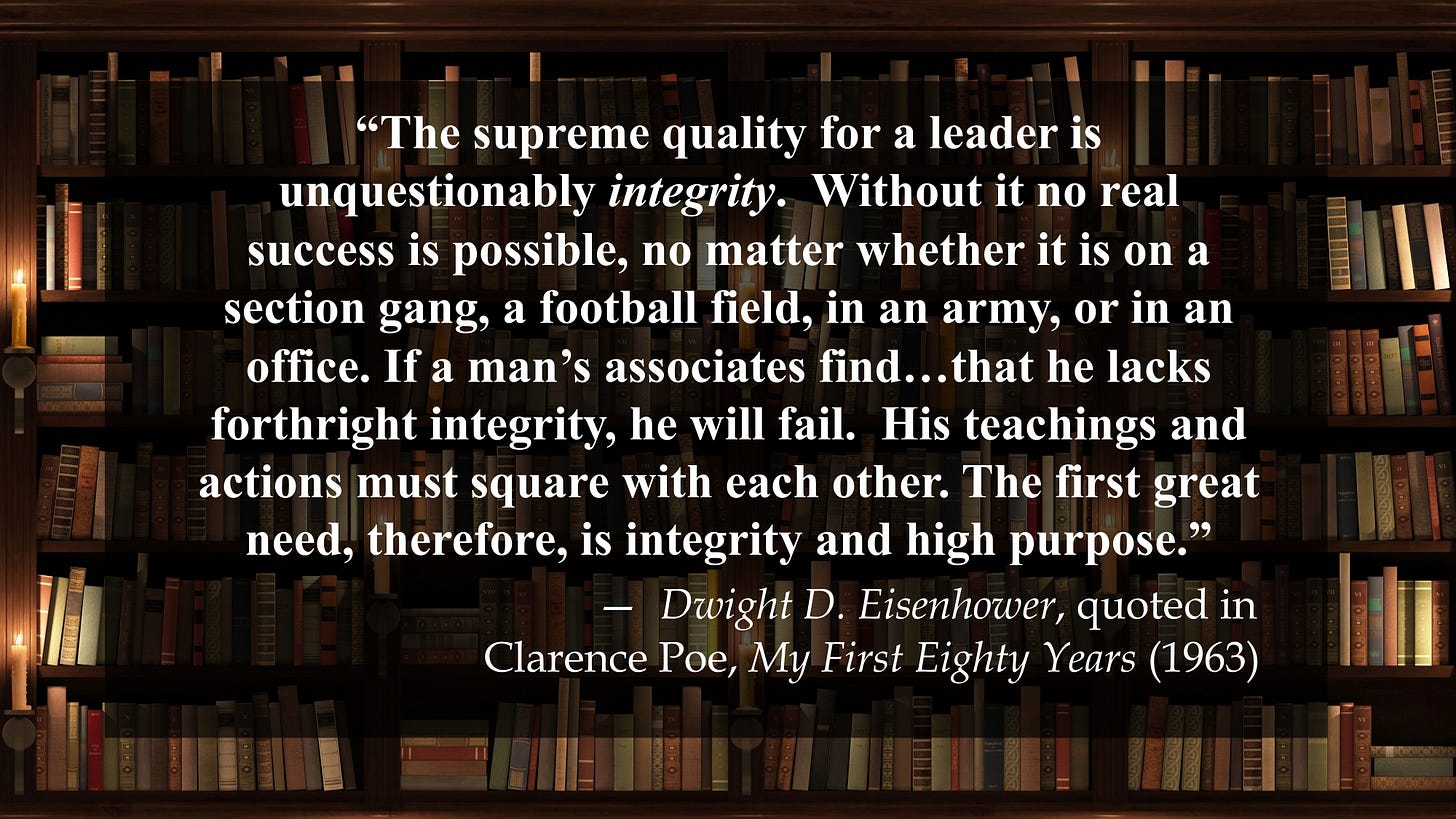

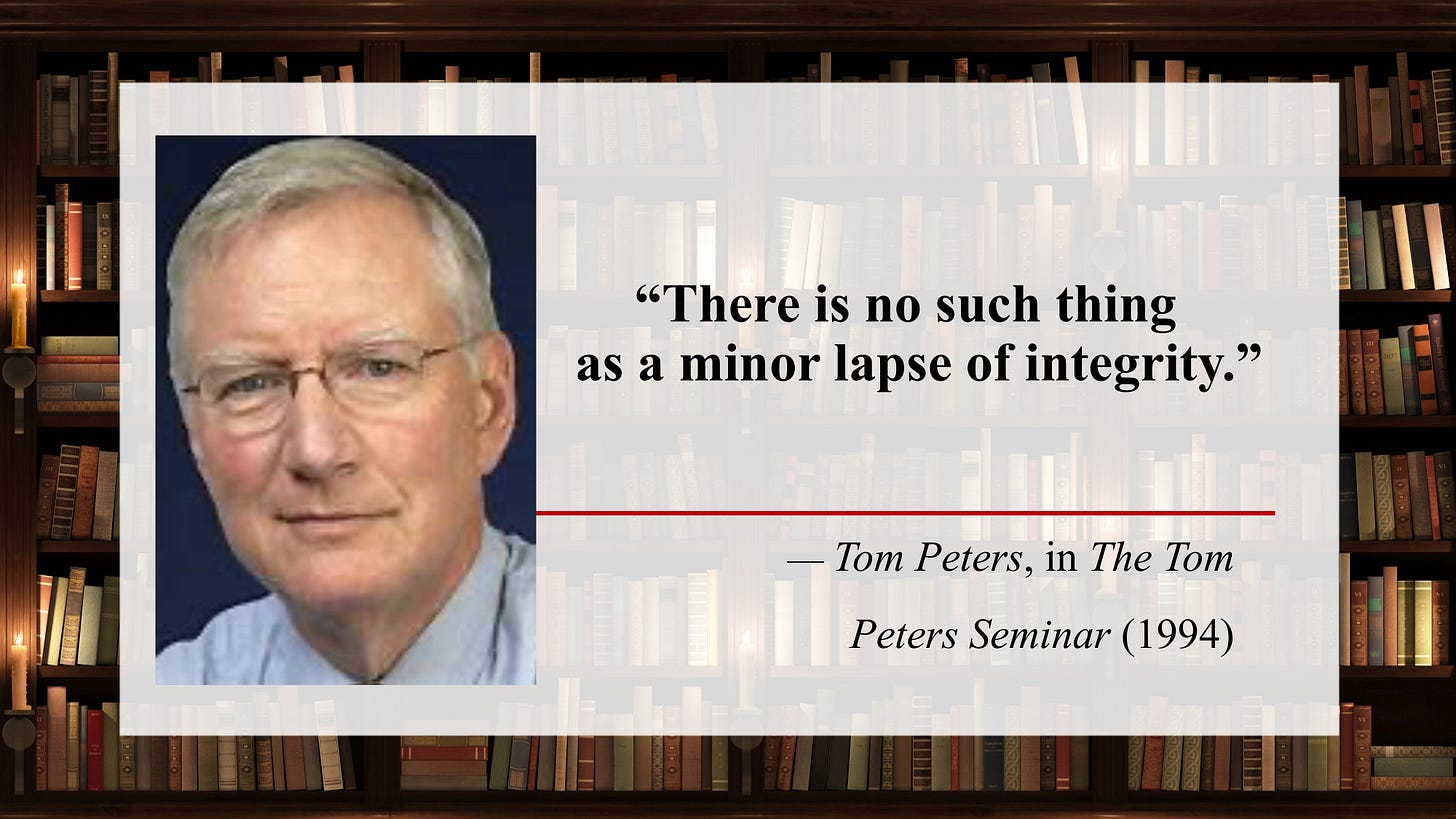
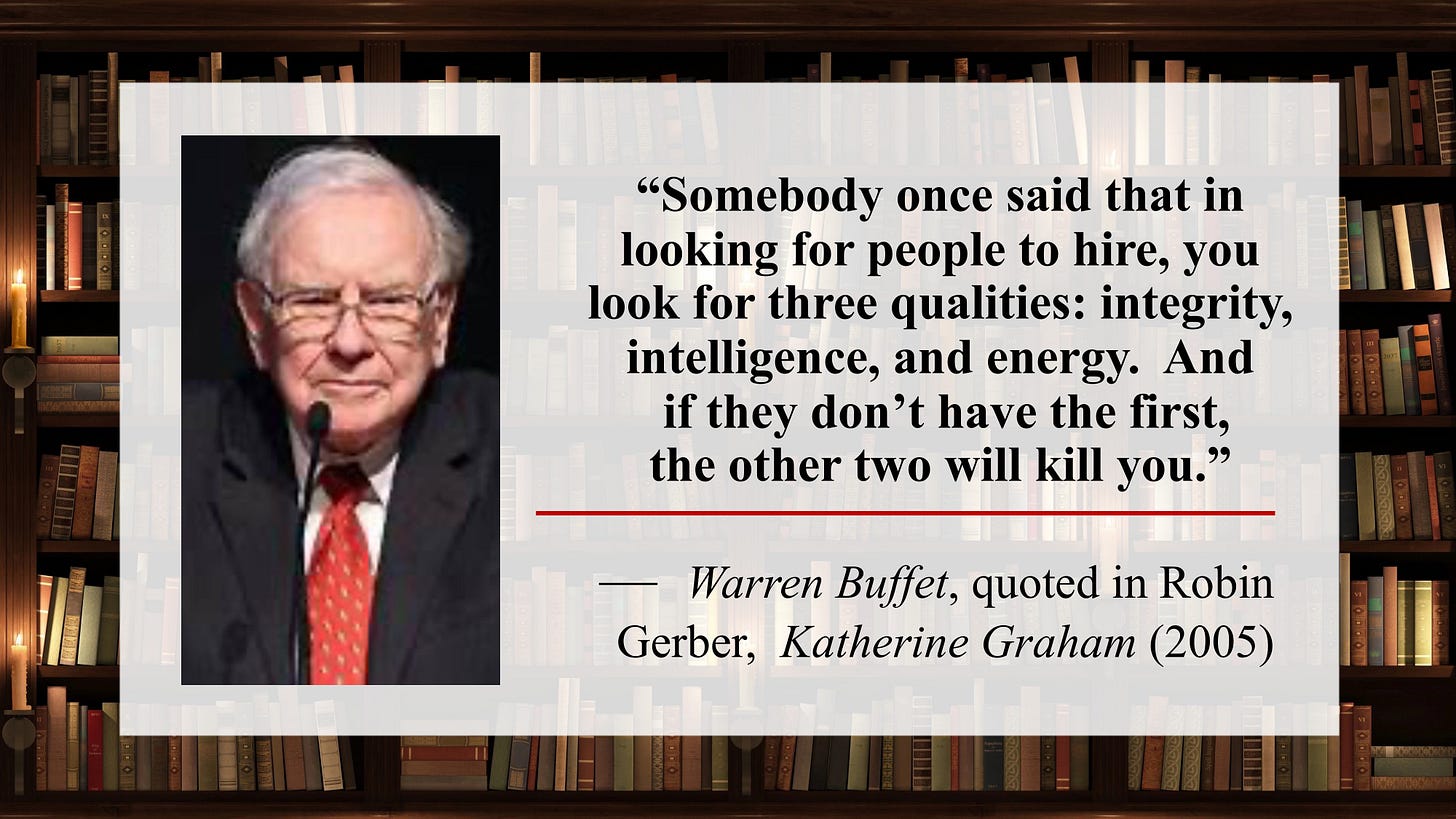
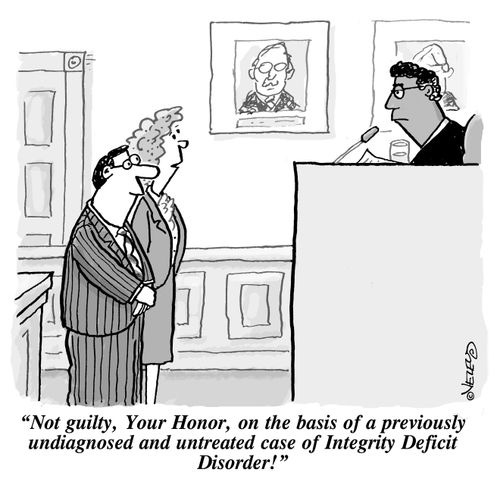

One of my favorite (and guiding) quotes was an anonymous "filler" at the bottom of a newspaper column (The Lubbock Avalanche-Journal, 1970): "A man should live so that when he's all alone he's in good company."
Another, of course, was from character Wes Crowley from The Wes Crowley saga: "Upright is not a matter of degree."
Mardy, another stimulating topic and I love your cartoon on integrity. I find integrity to be an elusive subject, similar to what people say about obscenity, you know it when you see it. To add to your fine list of quotations, I like these two. From dog trainer Cesar Milan, “I believe in integrity. Dogs have it. Humans are sometimes lacking it.” And Lincoln’s line” “I am not bound to win, but I am bound to be true. I am not bound to succeed, but I am bound to live up to what light I have.” Thanks for the light you shine each week on ideas we can live by.